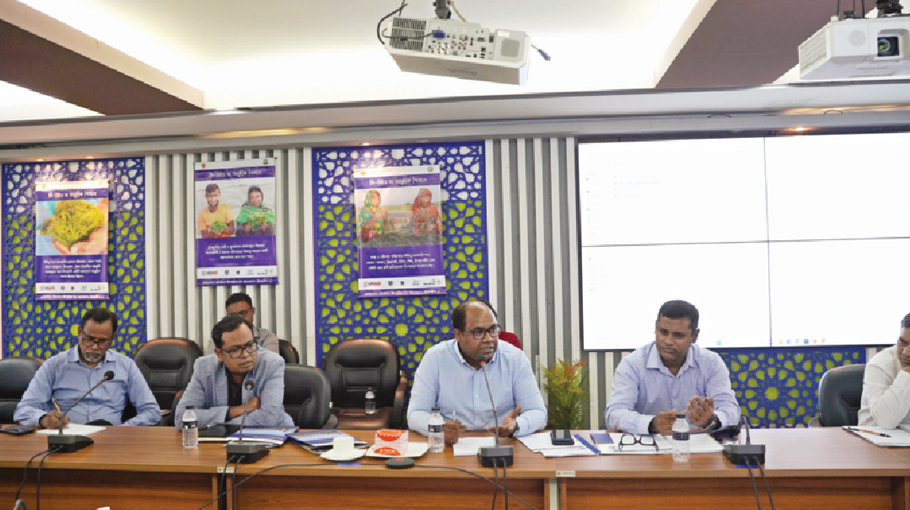Proper use of seaweed will boost blue economy


Speakers at a workshop have said that Bangladesh currently lags behind in seaweed production despite its natural richness in this regard. The country has a 710-km long coastline with natural richness of seaweed species, suitable climatic conditions and 25,000 km2 of coastal land.
In such a situation, proper utilization of seaweed will help pave the way for ‘blue economy’ emergence.
USAID’s Enhanced Coastal Fisheries in Bangladesh (ECOFISH II) of WorldFish Bangladesh hosted the workshop in collaboration with the Department of Fisheries Bangladesh. The workshop titled ‘Seaweed farming in maritime areas of Bangladesh: Potentials and Challenges’ was held at the conference room of the Department of Fisheries in Dhaka on Sunday (September 24, 2023).
ECOFISH II facilitated dialogues by sharing the results and experiences of work on seaweed value chain in coastal and maritime areas, discussing current challenges, and exploring options for maximizing the potential of seaweed farming.
Participants in this workshop include stakeholders actively involved in seaweed-related activities, such as representatives from DoF, BFRI, BORI, BRAC, universities, FAO, USAID, and stakeholders from the private sectors.
The workshop was chaired by Chris Price, Regional Director of WorldFish for South Asia. Anisur Rahman Talukder, Additional Director General of Department of Fisheries; attended the event as the chief guest while Syed Md. Alamgir, Principal Scientific Officer of Department of Fisheries; was present at special guest.
Mohammad Mokarrom Hossain, Chief of Party at USAID's ECOFISH II, WorldFish Bangladesh; and Md. Nahiduzzaman, Scientist, USAID's ECOFISH II, WorldFish Bangladesh; also spoke on the occasion.
In his speech, Mohammad Mokarrom Hossain said that the nutritional value and potential of seaweed are enormous in Bangladesh. Commercial seaweed production can benefit people in various ways, including industrially, as a super food, economically via producing raw materials of pharmaceutical and livestock feed industries. It decreases carbon emissions and can be an excellent source of greenhouse gas reduction, he added.
Bangladesh is currently trailing behind the seaweed production despite having a natural richness. The significance of seaweed gained momentum after the successful resolution of the sea border dispute with India in 2014, coinciding with the emergence of the term ‘blue economy’.
Among various initiatives, USAID-funded ECOFISH II implemented by WorldFish has been actively engaged in research and development endeavors to boost seaweed production. This collaboration, which includes partners like Chattogram Veterinary and Animal Science University (CVASU), has led to the development of floating seaweed farming technology in the marine ecosystems of Cox's Bazar, Bangladesh.
This innovative technology holds the potential to enhance seaweed production, strengthen climate resilience in aquatic food systems, improve the livelihoods of coastal fisher communities, and contribute to the conservation of aquatic biodiversity. The project also has developed habitat suitability map for different seaweed culture systems along the coastal and maritime territory of Bangladesh.
Md. Nahiduzzaman said, “We have a large population that relies on sea fishing. Seaweed can provide men with new prospects while also expanding women's economic sources. Bangladesh has a natural seabed in the Bay of Bengal, which has the potential to lead to several accomplishments. Government organizations, research institutions, non-government, and public-private stakeholders need to collaborate and actively participate to ensure the sustainability of seaweed initiatives.”
ECOFISH II has also collaborated with Noakhali Science and Technology University (NSTU) to develop ready-to-use (RTU) seaweed powder. This nutrient-rich product is suitable for incorporation into a wide array of food and feed items. This value addition offers promising opportunities for seaweed growers, opening doors to explore potential markets.
While seaweed farming has significant potential in the Bay of Bengal, there are challenges that need to be addressed. These challenges include strengthening the value chain through diversified product development, utilize seaweedin livestock feed and agar production, branding of seaweed-based products, and creating awareness and demand for these products in domestic markets.


